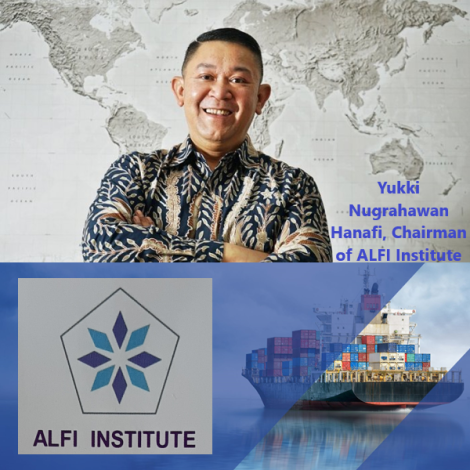Trade tensions, shifting policies like the United States’ reciprocal tariffs, and the unstable Rupiah continue to test the durability of national shipping businesses. While global and domestic challenges persist – from overlapping exports within ASEAN to geopolitical uncertainty – Indonesia is well-positioned to maintain stable growth in 2025, Yukki Nugrahawan Hanafi, Chairman of ALFI Institute, has said.
In a report carried by the Indonesia Shipping Gazette, Yukki explained that despite early signs of a slowdown in the first quarter, several key domestic indicators remain stable, and progress in global tariff negotiations, particularly involving the U.S., Indonesia, China, and other countries, offers a more measured outlook for the rest of the year.
Yukki also noted that the reciprocal tariffs imposed by the U.S. are exerting pressure on growth. According to the Ministry of Finance, these tariffs could shave off up to 0.5% from GDP. However, the situation also presents an opportunity. The trade war encourages the government to accelerate deregulation, improve ease of doing business, enhance industry competitiveness, and diversify export markets.
With negotiations underway between the U.S. and several global players, including China and the EU, the economic headwinds of 2025 appear increasingly manageable. That said, a responsive and strategic policy approach is critical to maintaining growth momentum.
The logistics and transportation sector remains a cornerstone of Indonesia’s economic engine. According to BPS data, this sector grew by 13.96% in 2023 and contributed IDR 1,000 trillion to GDP.
Recent investment figures from BKPM highlight this further. In Q1 2025, the transportation, warehousing, and telecommunications sector attracted IDR 66.5 trillion in investment, a 14.3% of total realization, making it the second-largest contributor.
However, despite this strong performance, Indonesia’s logistics efficiency lags behind regional peers, ranking 63rd out of 139 countries. For comparison, Singapore ranks 1st, Malaysia 26th, Thailand 34th, the Philippines 43rd, and Vietnam 43rd.
To improve logistics performance and sustain economic growth, Yukki calls on the government to focus on accelerating infrastructure development, embracing digital transformation, and streamlining regulations in the transport and logistics sector.
Also see this related article: Indonesia Slapped with Higher US Tariffs
Talk to us at Jalak Kargo Logistik for up-to-date information about shipping and customs – including any questions about tariffs.



